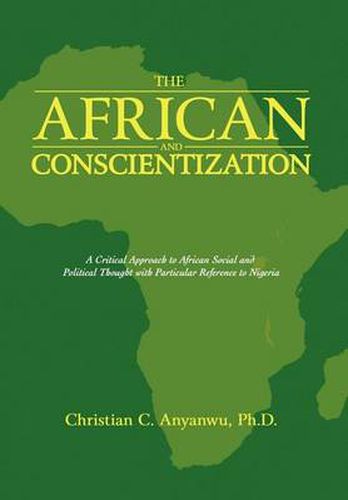Readings Newsletter
Become a Readings Member to make your shopping experience even easier.
Sign in or sign up for free!
You’re not far away from qualifying for FREE standard shipping within Australia
You’ve qualified for FREE standard shipping within Australia
The cart is loading…






This title is printed to order. This book may have been self-published. If so, we cannot guarantee the quality of the content. In the main most books will have gone through the editing process however some may not. We therefore suggest that you be aware of this before ordering this book. If in doubt check either the author or publisher’s details as we are unable to accept any returns unless they are faulty. Please contact us if you have any questions.
The withdrawal of imperial colonizers from Africa in the second half of the 20th century precipitated the need for newly independent African nations to establish political, economic, and social structures that would ensure the development of cohesive, stable, and functional nations. While Africans yearned for independence, once granted, the challenges of nation-building became apparent immediately. Nigeria, like many African nations, has stumbled through the early postcolonial period with no clear post-colonial direction, dashing the hopes of its people and undermining confidence in its future. This book makes the case that the protracted decades of underdevelopment in Africa, and especially Nigeria, is traceable to a crisis of leadership that has crystallized in the institutionalization of organized corruption as part of its professional ethos. It argues that as a direct consequence of such practices over several decades, the population has been dehumanized. The situation of Africa in general, and Nigeria in particular, has been deemed so inimical and colossal that Justice Oputa's panel advised a program of moral action "from kindergarten right through to the entire polity" (Report of the Human Rights Violations Investigation Commission, 2002). This is an indictment on the Nigerian population, and rightly so because for more than 40 years after independence, the country has been through a spiraling crisis in leadership and corruption such that massive looting of the national treasure is unprecedented in the history of developing countries. So many attempts have been made in search of national ideology that might spur development. This writer is proposing, in this vein, the implementation of a Conscientization philosophy similar to Paulo Freire's as a viable ideology that would arrest and reverse the deteriorating situation. Freire's thought was influenced largely by socio Economic and political situations in Brazil. These same ugly and dehumanizing conditions are now generally characteristic of Nigeria. Hence, Freire's education as "practice of freedom" is very relevant to the Nigerian situation. This dissertation elaborates how to develop and implement the Conscientization philosophy and shows why it would be extraordinarily appropriate in Nigeria in such a way as to contribute to the good society.
$9.00 standard shipping within Australia
FREE standard shipping within Australia for orders over $100.00
Express & International shipping calculated at checkout
This title is printed to order. This book may have been self-published. If so, we cannot guarantee the quality of the content. In the main most books will have gone through the editing process however some may not. We therefore suggest that you be aware of this before ordering this book. If in doubt check either the author or publisher’s details as we are unable to accept any returns unless they are faulty. Please contact us if you have any questions.
The withdrawal of imperial colonizers from Africa in the second half of the 20th century precipitated the need for newly independent African nations to establish political, economic, and social structures that would ensure the development of cohesive, stable, and functional nations. While Africans yearned for independence, once granted, the challenges of nation-building became apparent immediately. Nigeria, like many African nations, has stumbled through the early postcolonial period with no clear post-colonial direction, dashing the hopes of its people and undermining confidence in its future. This book makes the case that the protracted decades of underdevelopment in Africa, and especially Nigeria, is traceable to a crisis of leadership that has crystallized in the institutionalization of organized corruption as part of its professional ethos. It argues that as a direct consequence of such practices over several decades, the population has been dehumanized. The situation of Africa in general, and Nigeria in particular, has been deemed so inimical and colossal that Justice Oputa's panel advised a program of moral action "from kindergarten right through to the entire polity" (Report of the Human Rights Violations Investigation Commission, 2002). This is an indictment on the Nigerian population, and rightly so because for more than 40 years after independence, the country has been through a spiraling crisis in leadership and corruption such that massive looting of the national treasure is unprecedented in the history of developing countries. So many attempts have been made in search of national ideology that might spur development. This writer is proposing, in this vein, the implementation of a Conscientization philosophy similar to Paulo Freire's as a viable ideology that would arrest and reverse the deteriorating situation. Freire's thought was influenced largely by socio Economic and political situations in Brazil. These same ugly and dehumanizing conditions are now generally characteristic of Nigeria. Hence, Freire's education as "practice of freedom" is very relevant to the Nigerian situation. This dissertation elaborates how to develop and implement the Conscientization philosophy and shows why it would be extraordinarily appropriate in Nigeria in such a way as to contribute to the good society.